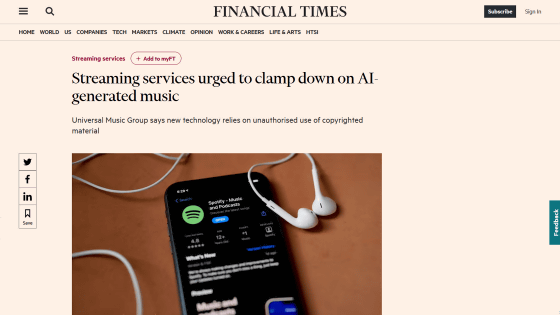``I want you to stop using songs for AI training,'' Universal Music Group requests Spotify and Apple Music

In recent years, the emergence of AI that generates images and text has been a big topic, but behind it there is a concern that existing jobs will be taken away by AI. The Chinese game industry has already said that
Streaming services urged to clamp down on AI-generated music | Financial Times
https://www.ft.com/content/aec1679b-5a34-4dad-9fc9-f4d8cdd124b9

Streaming sites urged not to let AI use music to clone pop stars | Music industry | The Guardian
https://www.theguardian.com/business/2023/apr/12/streaming-sites-ai-copyrighted-music-copycat-tracks
Universal Music Asks Spotify, Apple to Block AI Access To Songs – Billboard
https://www.billboard.com/pro/universal-music-asks-spotify-apple-stop-ai-access-songs/
Report: UMG wants DSPs to block unlicensed AI-training scraping - Music Ally
https://musically.com/2023/04/12/report-umg-wants-dsps-to-block-unlicensed-ai-training-scraping/
The Financial Times reported that Universal Music Group has sent an email to music streaming services such as Spotify and Apple Music asking them to prevent their songs from being used to train AI.
In an email, Universal Music Group said, 'We are aware that certain AI systems have copyrighted content without obtaining the necessary consents or paying compensation from the rights holders who owned or produced the content. We recognize that content may be learning.' 'We do not allow artists to incorporate content into our platform that violates the rights of artists and other creators by preventing unauthorized use of their songs. We have a moral and commercial responsibility to do so, and we expect platform partners to want to prevent their services from being used to the detriment of artists. I am doing it,' he said.

In addition, Universal Music Group has asked music streaming services and digital music sales platforms to block the download of song data used for AI training, and said, 'We are working to protect the rights of our company and artists. We will not hesitate to take measures,” he warned.
Billboard, a music industry magazine, said it had corroborated the contents of the emails from both Universal Music Group and the music streaming service. However, it seems that it is unknown what kind of means the Universal Music Group is specifically planning and what they are looking for in the music streaming service. When contacted by Billboard, a Spotify representative declined to comment on the Universal Music Group email, and Apple Music and Amazon Music did not immediately respond.
Billboard points out that major labels have very complex business partnerships with music streaming services, and it is unlikely that Universal Music Group will sue the music streaming service because the songs were used to train AI. Instead, we anticipate that lawsuits will be more likely to be filed directly against AI platforms.

Speaking of general generation AI at the time of article creation, image generation AI Stable Diffusion and Midjourney, interactive AI GPT-4 and ChatGPT come to mind, but music generation AI has already reached considerable quality. .
For example, on YouTube, an AI-reproduced version of Kanye West (now Ye) covering Queen's ' Don't Stop Me Now ' and Kesha's ' Tik Tok ' has been posted.
Kanye West-Don't Stop Me Now (AI Cover)-YouTube
Kanye West-Tik Tok (AI Cover)-YouTube
This isn't the first time the music industry has expressed concerns about generative AI. In October 2022, a music industry group, the Recording Industry Association of America (RIAA), sent a letter (PDF file) to the Office of the United States Trade Representative , stating that the songs generated using AI are almost the same as the tracks of famous artists. It is pointed out that the quality has been reached. AI services and their partners are using the songs of artists belonging to the RIAA for training without permission, claiming that 'the rights are infringed by copying members' copyrighted works without permission.'
British daily newspaper The Guardian points out that AI systems are trained with a large amount of content, but that this content is usually collected without explicit consent from the creator or source. On the other hand, AI researchers argue that their actions fall under fair use because the final product, the AI model, does not conflict with the original material.
In a March 2023 interview, Michael Nash , vice president of digital strategy at Universal Music Group, said, ``Most AI systems have to do basic training on vast amounts of copyrighted content. We have acquired the knowledge base necessary to develop our 'own' IP, and we are not compensating the people who produce the essential materials for these trainings. In short, many AI developers simply ignore the ethics of exploiting the creative work of others, or dangerously distort the notion of fair use justifying it, and are absolutely unsupportive. I will not do that.”
Related Posts:
in Software, Web Service, Video, Art, Posted by log1h_ik







